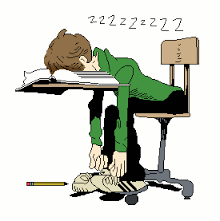Did you know?
Did you know that you may be sleeping an average of 1–1.6 hours less than college students did a generation ago? While many adults function best with around 8 hours of sleep (and this varies depending on many variables: your environment, health, age, etc.), college students today may be averaging only 6–6.9 hours of sleep as a result of all-nighters, cramming, parties, TV, the internet, and a general overload of activity. In fact, 8 hours of sleep may seem unreasonable for many college students; residence hall life is remarkably noisy, distractions are plentiful, and you may have a job or have a family to care for in addition to school. Stress and anxiety about coursework and your personal life rob many of a decent bout of shut-eye. In fact, 66% of U-M students experience sleep difficulty. In other other words, if you are having trouble sleeping, you are not alone.
Sleep Deprivation: Symptoms and Consequences
Sleep helps you remember what you learn and prepares you for your next challenge. If you are experiencing any of the following for a period of a few weeks, commonly known as insomnia, you may want to consider asking for help.
- difficulty falling asleep
- wake up frequently during the night
- fall asleep at inappropriate times even after a night of adequate sleep
- sleeping too much (more than 9 hours)
- have sudden attacks of uncontrollable sleep or muscle weakness
- have nightmares or night terrors (the experience of awakening in a terrified state without recollection of a dream) that interrupt your sleep
- sleep-walking
Sleep Loss can be Linked to Depression
Many students aren't surprised when you tell them that attending college increases the incidence of both sleep problems and depression. Depression is already two times more common in the general population, affecting approximately 20% of students, and researchers believe that lack of sleep contributes to this high rate. What students often fail to realize is that sleep problems that persist for more than two weeks can actually be a risk factor for developing depression. More than 80% of people who suffer from depression also have difficulty sleeping, and if sleep problems persist after depression has subsided, the risk of relapse increases.
When Counting Sheep Doesn’t Help: Tips to Improve Your Sleep
While 8 hours of sleep may seem unreasonable, you should not underestimate the power of good quality sleep. If you are having trouble sleeping, here are some suggestions to help:
- Develop sleep rituals or sleep-promoting bedtime routines. Do the same things in the same order before going to bed to cue your body to slow down and relax. Stop studying and don’t get into any stimulating discussions or activities a half hour or hour before bed. Just before going to bed, do something to relax yourself: read a book for leisure (not a text book or a journal article for class), play your guitar, listen to quiet music, write in a journal.
- Exercise and/or keep physically active during the day. Strenuous exercise (brisk walking, swimming, jogging, squash, etc.) in late afternoon can promote more restful sleep. This is especially important the day after a bad night’s sleep. While regular physical activity is good, exercising just before bedtime may actually make it harder to go to sleep.
- Create a “to do” list throughout the day and keep a pad and pencil near your bed. If your thoughts are racing as you are trying to sleep and if you think of something you want or need to remember, jot it down. Then let the thought(s) go. There will be no need to lie awake worrying about remembering it.
- Cut down on alcohol. Alcohol might help you fall asleep, but it often results in shallow and disturbed sleep, abnormal dream periods, and frequent early morning awakening.
- Avoid large meals three hours before bed. Limit yourself to light snacks when studying late at night.
- Avoid routine use of sleeping pills or other sleep aids, which reduce sleep quality.
- Take a short nap (30 minutes or less), as early in the day as possible, if you are tired. While short daytime naps can be refreshing, longer naps can upset your internal clock.
- Reduce your intake of caffeine and nicotine 4–6 hours before going to sleep. If coffee shops are a common late night study place, try decaffeinated coffee or tea if you crave something warm. Drink decaffeinated pop instead of regular pop. Stimulants interfere with your ability to fall asleep and progress into deep sleep.
When Should I Seek Help?
If restless or sleepless nights continue for a period of several weeks, think about talking with a therapist or talking with your medical doctor. Sometimes you may have conflicts that you are unaware of which may be preventing you from sleeping peacefully. Treating insomnia often entails treating the condition causing the insomnia (e.g., stress, depression) and relearning healthy sleep habits, and a therapist can help you with this. Sleeplessness may also be a result of a more severe medical problem (or may lead to increased health problems) and you may need to see a physician.
If you think you would like counseling support, please contact your campus counseling center.

